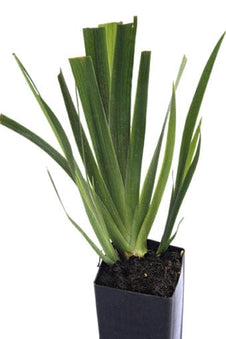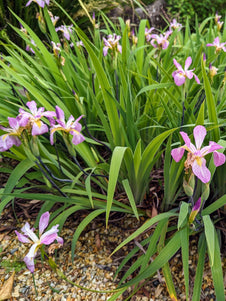







Blue Flag
Blue Flag
- In stock, ready to ship
- Inventory on the way

Usually available: All year
Life cycle: Perennial
Height: 60cm - 1m
Position: Sun / part shade
Soil preference: Moist
This is how we pack and send your Herb Plants to all states except TAS & WA
You will receive
- 1 Blue Flag Herb Plant in a 50 X 75mm tube - General growing instructions
All of our Herb Plants are grown organically with certified organic potting mixes and fertilizers
Botanical Name: Iris versicolor
Iris versicolour is a perennial herb growing from 60cm to 1 meter high. Large clumps are formed by the creeping rhizomes sending up erect stems. The basal leaves are broad, sword like and folded on the midribs so that they take on a flat fan like appearance. The flowers stalks are sent up from the base in summer with each clump producing 3-4 flowers. The blue- violet flowers are self-fertile and have a yellow and white splash at the base of the sepals.
Iris Versicolour, also known as Blue Flag, has a number of other common names, such as, Harlequin Blue Flag, Larger Blue Flag, Poison Flag, Flag Lily, Snake Lily, Dagger Lily, Liver Lily and Water Lily. Scientific synonyms include Iris boltoniana, Iris caurina, Iris dierinckii and Limniris versicolour. The name ‘flag’ comes from the Middle English word ‘flagge’ which means reeds or rushes. The word ‘versicolour’ means ‘of many colours’.
This plant is native to eastern and central North American, favouring low grounds, swamps, marshes, wet meadows and other damp group near water courses. This species is known as a marginal aquatic plant and can be grown in up to 60 cm of water. The floral display is accentuated when there is a group of plants and the many leaves bring their own sense of natural beauty.
Growing Conditions
Iris versicolour prefers sun to light or semi shade and sandy or loam-peat like soils. It is happy in warm climates, but is frost tolerant to -20 c. This is a good plant to try in boggy areas, low damp grounds and around pond edges where the pot can be placed in up to 60 cm of water. Alternatively, Blue Flag could be planted in a decorative container in permanent water with a muddy base or in a secondary pot. It spreads by rhizomes, so be prepared for the initial clump to grow if planted in good ground conditions. It will easily naturalise if given the right opportunity and is very low maintenance. The plant may be divided after flowering in summer and autumn. Large clumps may be planted directly into the ground, but smaller sections may need to spend time in smaller containers before being planted out into the ground. Gloves are recommended when handling the rhizomes.
Medicinal Uses
The roots of Iris versicolour have a long history of medicinal use by many Native American Indian tribes. Some tribes even used it to ward off rattlesnakes by handling the roots so that the scent permeated their skin, thus warning away the snakes. The roots are generally harvested in late summer and autumn after flowering has concluded. Modern herbalists use this plant mostly for detoxification of the body since it helps the body to eliminate urine, increases bile production and is a mild laxative.
The roots are anti-inflammatory, cathartic, alterative, diaphoretic, emetic, sialagogue and cholagogue. They also act as stimulants for the circulatory and lymphatic systems. The roots may be boiled to prepare a poultice that is used to relieve pain and swelling associated with bruises and sores. Other external uses include treating skin conditions, wounds and rheumatic joints. The root preparation is detoxifying for psoriasis, herpes, arthritis and swollen glands.
This plant is known to have toxic effects on humans and animals and should only be used in very small amounts. The fresh root is very acrid and may cause vomiting and/or nausea. The sap may cause skin irritations, irritate the throat and cause headache and irritate the eyes resulting in inflammation.
Culinary Uses
Iris versicolour is not known to be edible. It contains toxic chemicals that are known to cause serious harm to humans and animals that consume this plant.
Other Uses
The flowers may be used to create a blue infusion that is used as a substitute litmus test for determining alkalinity or acidity. The leaves have been used to weave baskets and mats.
All information provided on this website is for informational purposes only. Please seek professional advice before commencing any treatment.





